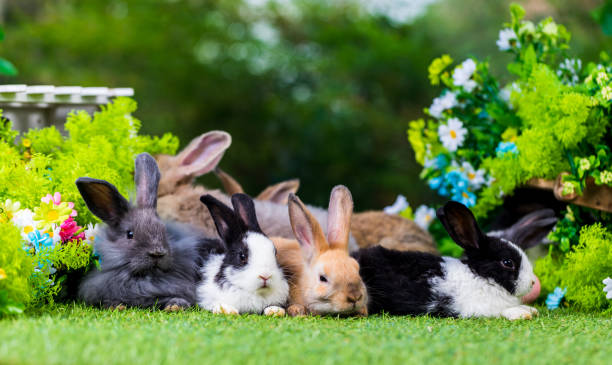
Fluffy Royalty: Discover the Top Rabbit Breeds Renowned for Their Gentle Nature
Explore the most affectionate, calm, and family-friendly rabbit breeds celebrated for their gentle temperament, making them perfect companions for pet lovers seeking warmth, softness, and loyal friendship.
🐶 Pet Star
28 min read · 23, Jul 2025

Introduction to Gentle Rabbit Breeds: Why Temperament Matters
Rabbits are adored worldwide for their soft fur and charming personalities, but not all breeds share the same temperament. When choosing a pet rabbit, understanding which breeds are known for their gentle and calm nature is essential, especially for families with children, elderly caretakers, or first-time rabbit owners. This article dives deep into the top rabbit breeds celebrated for their friendly disposition, providing expert insights, breed characteristics, and care tips to help you find your perfect fluffy companion.
The Importance of Choosing a Gentle Rabbit Breed
Why Temperament is as Important as Appearance
While a rabbit’s appearance — from size to fur type — is often what draws potential owners in, temperament is crucial for ensuring a harmonious relationship. Gentle rabbits tend to be more sociable, less aggressive, and easier to handle, reducing stress for both the pet and owner.
Expert Insights on Rabbit Behavior
Veterinarians and rabbit behaviorists emphasize the importance of breed temperament. According to Dr. Emily Rivers, a leading exotic pet veterinarian, “Selecting a rabbit breed with a naturally calm demeanor can greatly improve bonding experiences and the overall health of the pet.”
Top Rabbit Breeds Known for Their Gentle Nature
1. Holland Lop: The Pocket-Sized Gentleman
The Holland Lop, known for its compact size and distinctive floppy ears, is famously gentle and affectionate. Weighing between 2 to 4 pounds, this breed is ideal for those seeking a cuddly yet manageable pet.
- Temperament: Sweet-natured, social, and intelligent.
- Care Tips: Requires regular grooming due to dense fur. Enjoys interactive play and gentle handling.
- Fun Fact: Holland Lops often recognize their owner’s voice and respond affectionately.
2. Mini Rex: Soft Fur and Soft Heart
Mini Rex rabbits stand out for their velvety plush coat and calm disposition. Their medium size and low-maintenance fur make them favorites for indoor living.
- Temperament: Calm, curious, and tolerant of handling.
- Care Tips: Coat requires minimal grooming; regular nail trims recommended.
- Expert Tip: Mini Rex rabbits thrive with mental stimulation, such as puzzle toys.
3. English Angora: The Fluffy, Gentle Giant
English Angoras are instantly recognizable by their long, silky wool. Despite their extravagant fur, they are surprisingly docile and affectionate, though they need committed grooming.
- Temperament: Gentle, patient, and docile.
- Care Tips: Daily grooming essential to prevent matting. Provide ample space due to their size.
- Statistic: Studies show Angora rabbits often exhibit lower stress levels when socialized early.
4. Californian Rabbit: The Calm Classic
Known for their sleek white coat with characteristic dark ears, noses, and feet, Californian rabbits balance calmness with curiosity.
- Temperament: Mild-mannered, friendly, and easily trainable.
- Care Tips: Regular exercise and social interaction prevent boredom.
- Interesting Fact: Popular as show rabbits due to their steady temperament.
5. Lionhead Rabbit: The Fluffy, Friendly Prince
With a mane-like ruff around their heads, Lionheads combine regal appearance with warm, approachable personalities.
- Temperament: Playful, affectionate, and gentle with children.
- Care Tips: Moderate grooming needed to maintain their unique fur.
- Expert Insight: Lionheads respond well to positive reinforcement training.
6. New Zealand White: The Gentle Giant of the Rabbit World
Despite their larger size, New Zealand Whites are known for their docile and patient nature, often making excellent family pets.
- Temperament: Calm, tolerant, and highly social.
- Care Tips: Requires ample space and a balanced diet to maintain health.
- Statistic: Frequently used in therapy programs due to their gentle demeanor.
7. Polish Rabbit: Small Size, Big Heart
Polish rabbits are small but renowned for their calmness and affectionate nature, making them excellent lap pets.
- Temperament: Friendly, quiet, and gentle.
- Care Tips: Minimal grooming required; thrives with gentle handling.
- Fun Fact: Their petite size allows for easy indoor living arrangements.
8. English Spot: The Playful Gentle Breed
Recognizable for their striking spotted coat, English Spots are both energetic and gentle, balancing playfulness with friendliness.
- Temperament: Sociable, curious, and gentle when handled properly.
- Care Tips: Requires regular exercise to channel their energy.
- Expert Tip: Early socialization enhances their gentle nature.
Understanding Rabbit Behavior: How to Recognize a Gentle Rabbit
Signs of a Gentle Rabbit
- Approaches humans calmly without signs of fear or aggression.
- Enjoys gentle petting and seeks interaction.
- Exhibits relaxed body language, such as lying stretched out or softly blinking.
- Responds positively to training and handling.
Tips from Rabbit Behaviorists
Dr. Lisa Bell, a certified rabbit behavior specialist, states, “Gentle rabbits tend to have consistent and predictable behavior patterns. Owners should observe signs like relaxed ears and a calm gait to assess temperament.”
How to Foster and Maintain a Rabbit’s Gentle Nature
The Role of Early Socialization
Introducing rabbits to human interaction early significantly increases their likelihood of developing a gentle temperament. Regular, gentle handling and positive experiences reduce stress and fear responses.
Creating a Calm Environment
Stress negatively affects rabbit behavior. Providing a quiet, comfortable space with hiding spots and gentle background noise supports a rabbit’s calm nature.
Consistent Routine and Handling
Rabbits thrive with routine. Handling them at consistent times, using gentle techniques, and rewarding calm behavior help maintain their gentle disposition.
Care Considerations for Gentle Rabbit Breeds
Diet and Nutrition
Balanced diets rich in hay, fresh vegetables, and clean water support overall health and mood. Nutritional deficiencies can lead to irritability or stress-related behaviors.
Exercise and Mental Stimulation
Gentle breeds still require regular exercise and mental enrichment to stay healthy and happy. Toys, tunnels, and safe outdoor time foster curiosity and reduce anxiety.
Health Monitoring
Regular vet check-ups are vital to detect health issues that may affect behavior. Parasites, dental problems, or pain can cause irritability even in the gentlest breeds.
The Benefits of Owning a Gentle Rabbit
Emotional and Mental Health Benefits
Studies confirm that gentle pets reduce stress, anxiety, and loneliness. Rabbits are increasingly used in therapy and emotional support roles due to their calm demeanor.
Family and Social Advantages
Gentle rabbits make excellent family pets, teaching children responsibility and empathy. Their predictable behavior helps build trust and strong bonds.
Low Noise and Space Requirements
Unlike some pets, rabbits are quiet and can be comfortably housed indoors with proper care, making them ideal companions for various living environments.
Myths vs. Facts: Understanding Gentle Rabbit Breeds
Myth: All rabbits are skittish and unfriendly.
Fact: Many breeds, especially those listed here, are naturally calm and enjoy social interaction.
Myth: Gentle rabbits don’t need much stimulation.
Fact: All rabbits benefit from enrichment to stay happy and healthy.
Myth: Larger rabbits are always less gentle.
Fact: Size does not determine temperament; breeds like the New Zealand White prove otherwise.
Preparing Your Home for a Gentle Rabbit
Safe, Comfortable Housing
Rabbit-proof your home by removing hazards, securing electrical cords, and providing ample space with soft bedding.
Creating a Bonding Space
A quiet corner with familiar toys and treats encourages rabbits to relax and trust their human caregivers.
Routine Care Stations
Set up designated feeding and grooming areas to make daily care smooth and stress-free.
Training and Socializing Gentle Rabbit Breeds
Positive Reinforcement Techniques
Use treats and gentle praise to encourage good behavior and build trust.
Socializing with Other Pets
Introduce rabbits slowly to other pets in the household to maintain their calm demeanor and prevent stress.
Handling Children’s Interaction
Teach children gentle touch and respect for the rabbit’s space to foster positive experiences.
The Role of Grooming in Maintaining a Gentle Rabbit
Routine Brushing
Regular grooming prevents matting and can be a bonding activity that reinforces calm behavior.
Nail Trimming
Keeping nails short prevents injury and discomfort, reducing irritability.
Dental Care
Monitor teeth for overgrowth, which can cause pain and behavioral changes.
Seasonal Care for Gentle Rabbit Breeds
Temperature Sensitivity
Rabbits are sensitive to heat and cold. Provide adequate ventilation in summer and warmth in winter.
Shedding and Coat Maintenance
Certain breeds shed seasonally; increased grooming prevents discomfort and helps maintain their gentle nature.
Conclusion
Choosing a rabbit breed known for its gentle nature is a rewarding step toward building a lasting, affectionate relationship with your pet. These fluffy companions offer more than just adorable appearances; they bring calm, loyalty, and emotional comfort to homes of all sizes and types. From the petite Holland Lop to the regal New Zealand White, each breed carries unique characteristics that cater to different lifestyles and preferences while sharing a common thread of gentleness and sociability.
Understanding the temperament of various rabbit breeds is essential for ensuring a harmonious pet-owner bond. This knowledge helps prevent common frustrations related to fearfulness, aggression, or stress, allowing both rabbit and owner to thrive together. With proper care—balancing diet, grooming, exercise, and socialization—you create an environment where your rabbit’s gentle spirit can flourish.
Furthermore, gentle rabbits enrich family life by teaching responsibility, empathy, and patience, especially to children. Their calming presence has even found a place in therapeutic settings, showcasing their profound emotional benefits.
The journey of caring for a gentle rabbit breed requires commitment, but it is equally fulfilling. Whether you are adopting a rescue rabbit or purchasing from a reputable breeder, prioritizing temperament will lead to a happier, healthier pet and a more meaningful connection.
Ultimately, embracing these fluffy royals means inviting softness, warmth, and kindness into your daily life. With thoughtful preparation and ongoing care, your gentle rabbit will become a cherished companion, inspiring joy and comfort for years to come.
Q&A
Q1: What are the top rabbit breeds known for their gentle nature?
A1: Breeds like the Holland Lop, Mini Rex, English Angora, Californian, Lionhead, New Zealand White, Polish, and English Spot are renowned for their gentle temperament.
Q2: How important is grooming for fluffy breeds like the English Angora?
A2: Very important—daily grooming prevents matting and helps maintain the rabbit’s comfort and calm behavior.
Q3: Can children safely interact with gentle rabbit breeds?
A3: Yes, breeds such as the Lionhead and Polish are patient and friendly, making them suitable for children under supervision.
Q4: Do larger rabbit breeds tend to be less gentle?
A4: Not necessarily; many large breeds like the New Zealand White are calm and tolerant pets.
Q5: How can I help a shy rabbit become more sociable?
A5: Through gentle handling, positive reinforcement, and providing a safe, quiet environment to build trust over time.
Q6: What are signs that a rabbit is stressed or unhappy?
A6: Signs include hiding excessively, aggression, lack of appetite, and neglecting grooming.
Q7: Is spaying or neutering necessary for gentle behavior?
A7: Yes, it reduces aggression and territorial behaviors, promoting a calmer disposition.
Q8: How often should rabbits visit a veterinarian?
A8: At least once a year for check-ups, with more frequent visits if health issues arise.
Q9: Can rabbits be trained?
A9: Absolutely, gentle rabbits respond well to positive reinforcement training and can learn commands and litter habits.
Q10: What diet supports a rabbit’s gentle temperament?
A10: A high-quality hay diet, supplemented with fresh vegetables and clean water, supports overall health and calmness.
Similar Articles
Find more relatable content in similar Articles

Sustainable Pet Products: What to Look for in 2025...
As sustainability becomes a ce.. Read More

Vegan Pet Toys and Accessories That Last Longer...
As pet owners grow more eco-co.. Read More

How Pets Strengthen Family Bonds...
Pets are more than just compan.. Read More

How Climate Change Affects Wild and Domestic Animals...
Climate change is dramatically.. Read More
Explore Other Categories
© 2024 Copyrights by rPets. All Rights Reserved.